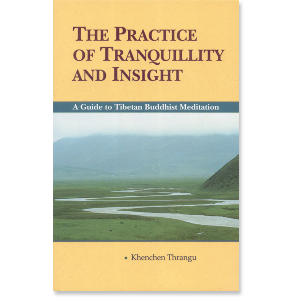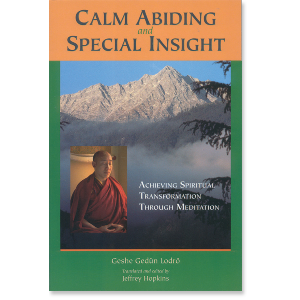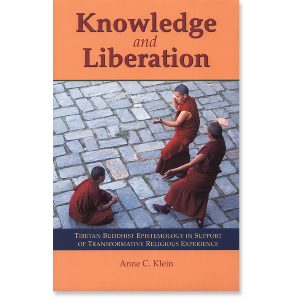The following article is from the Summer, 1998 issue of the Snow Lion Newsletter and is for historical reference only. You can see this in context of the original newsletter here.
The Practice of Tranquility & Insight
A Guide to Tibetan Buddhist Meditation
by Khenchen Thrangu Rinpoche 170 pp., b&w photo, 3 line drawings, 3 tables #PRTRIN $14.95
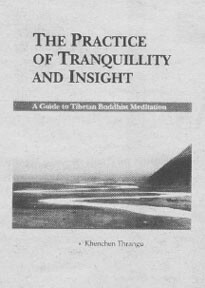 This is a practical manual to the two types of meditation that form the core of Buddhist spiritual practice. After only a few pages of reading, anyone would know enough to properly begin meditating. Tranquillity (Yama tha) meditation aims at stilling the mind, while insight (vipa Yyan) meditation produces clear vision, or insight into the nature of all phenomena. With masterful scholarship and the ability to make subtle ideas easy to understand and apply in practice, Khenchen Thrangu Rinpoche explains this unified system of meditation for students both beginning and advanced. He explains what to do and what to avoid, and explains the stages of deepening meditation so the practitioner can gauge progress. These teachings are based on the eighth chapter of the Treasury of Knowledge by the great nineteenth-century master Jamgon Kongtrul. With Thrangu Rinpoche's commentary, this complex, encyclopedic work is made accessible to Western students of meditation.
This is a practical manual to the two types of meditation that form the core of Buddhist spiritual practice. After only a few pages of reading, anyone would know enough to properly begin meditating. Tranquillity (Yama tha) meditation aims at stilling the mind, while insight (vipa Yyan) meditation produces clear vision, or insight into the nature of all phenomena. With masterful scholarship and the ability to make subtle ideas easy to understand and apply in practice, Khenchen Thrangu Rinpoche explains this unified system of meditation for students both beginning and advanced. He explains what to do and what to avoid, and explains the stages of deepening meditation so the practitioner can gauge progress. These teachings are based on the eighth chapter of the Treasury of Knowledge by the great nineteenth-century master Jamgon Kongtrul. With Thrangu Rinpoche's commentary, this complex, encyclopedic work is made accessible to Western students of meditation.
Thrangu Rinpoche has been a practitioner of meditation for over forty years. Famed as a scholar, he was asked to establish the Kagyu monastic college in Rumtek for His Holiness the Karinapa, head of the Kagyu lineage of Tibetan Buddhism. Born in eastern Tibet in 1933, Thrangu Rinpoche was recognized as the reincarnation of the great Thrangu Tulku. He pursued a traditional monastic education and received a geshe degree with honors from the Dalai Lama at age 35. Thrangu Rinpoche became the personal teacher of many important lamas. He has also engaged in twenty years of teaching Western students in seminars and retreats in over a dozen countries. He is well-known for taking complex teachings and making them understandable to the practitioner.
The Practice of Tranquillity and Insight
$29.95 - Paperback
Calm Abiding and Special Insight
Achieving Spiritual Transformation Through Meditation
by Geshe Gediin Lodro and Jeffrey Hopkins
334 pp., glossary, bibliography, index, #CAABSP $19.95
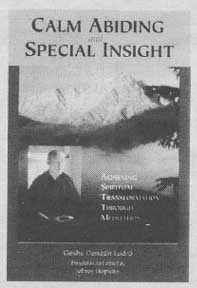
This manual presents a vivid picture of the intricacies of meditation, drawing the reader into a Tibetan world-view of spiritual transformation. Geshe Gediin Lodro, one of the foremost scholar-practitioners of Tibet, presents a landscape of mental development, revealing a living world of mental therapy replete with resources for describing, facing, and counteracting both superficial and systemic disorders. With extraordinary precision and detail, he describes how to undermine distracting afflictive states, doubts, and distortions that must be removed for the mind to become stable, calm, alert, and able to penetrate the false appearance of phenomena.
Geshe Gediin Lodro was born in the capital of Tibet, lhasa, in 1924. He entered Dre-bung Monastic University at lhasa at the age of nine as a novice monk. He took basic examinations in 1940, received full ordination in 1947, and gained the degree of geshe in 1961 in exile in India as the first among three scholars who were awarded the number one ranking in the highest class. A prodigious scholar, he was famed for his wide learning and ability in debate. In 1967, the Dalai Lama sent him to teach at the University of Hamburg, where he learned to speak German fluently and become a tenured member of the faculty. He served as Visiting Professor at the University of Virginia in 1979, when he gave the lectures that comprise this book. He passed away later in the same year.
Jeffrey Hopkins is Professor of Religious Studies at the University of Virginia, where he has taught Indo-Tibetan Studies and Tibetan language since 1973, and was Director of the University's Center for South Asian Studies for twelve years.
This is a new completely revised edition of Walking Through Walls.
Calm Abiding and Special Insight
$34.95 - Paperback
Knowledge & Liberation
Tibetan Buddhist Epistemology in Support of Transformative Religious Experience
by Anne Klein. 283 pp. #KNLIC $19.95, A Namgyal Institute Textbook.
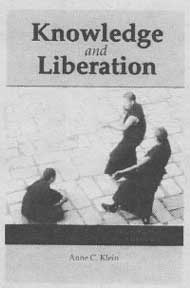 Anne Klein presents vividly and intimately many concepts essential to a deeper understanding of Buddhist philosophy and for realizing emptiness the process of naming, positive and negative phenomena, direct perception, and more. I highly recommend this book!Prof. Jeffrey Hopkins
Anne Klein presents vividly and intimately many concepts essential to a deeper understanding of Buddhist philosophy and for realizing emptiness the process of naming, positive and negative phenomena, direct perception, and more. I highly recommend this book!Prof. Jeffrey Hopkins
Buddhist philosophy is concerned with defining and overcoming the limitations and errors of perception. To do this is essential to Buddhism's purpose of establishing a method for attaining liberation. Conceptual thought, in this view, can lead to a liberating understanding, a transformative religious experience.
The author discusses the workings of both direct and conceptual cognition, drawing on a variety of Tibetan and Indian texts. This book is indispensable for anyone desiring a deeper understanding of the fundamental issues in Buddhist philosophy. It is also highly relevant to issues current in modem Western philosophy.
The Gelukba interpretation of Dignaga and Dharmakirti is greatly at variance with virtually all other scholarship concerning these seminal Buddhist logicians. The author clarifies these differences, considering both traditional Buddhist and modern scholarship, thus establishing what is unique to the Gelukba presentation and, in this light, examining reasons for the validity of this school's interpretation.
$34.95 - Paperback


